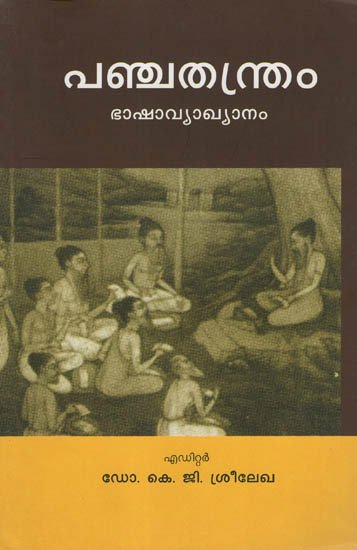Panchatantra [sanskrit]
by Dr. Naveen Kumar Jha | 2016 | 13,828 words | ISBN-13: 9788193077962
The Sanskrit edition of the Panchatantra referencing the English translation and grammatical analysis. Written by Vishnu Sharma and possibly dating as early as 1200 BCE, the Panchatantra (or Pancatantra) represents a collection of short stories teaching basic ethical values and moral conduct that was commonly practiced in ancient Indian. Alternative titles: Śrīviṣṇuśarman Pañcatantra (श्रीविष्णुशर्मन् पञ्चतन्त्र, Śrī-viṣṇuśarman pancatantra, श्री-विष्णुशर्मन्, Sri-visnusarman)
Verse 1.47
सा सेवा या प्रभु-हिता ग्राह्या वाक्य-विशेषतः ।
आश्रयेत् पार्थिवं विद्वांस् तद्-द्वारेणैव नान्यथा ॥ ४७ ॥
sā sevā yā prabhu-hitā grāhyā vākya-viśeṣataḥ |
āśrayet pārthivaṃ vidvāṃs tad-dvāreṇaiva nānyathā || 47 ||
The English translation of Panchatantra Verse 1.47 is contained in the book The Complete Pancatantra: Sanskrit Text with English Translation by Dr. Naveen Kumar Jha. This book is not available online so in order to read the full text and translation you should buy the book:
Buy now! English translation by Dr. Naveen Kumar Jha (2016)
Glossary of Sanskrit terms
Note: This extracts Sanskrit terms and links to English definitions from the glossary, based on an experimental segmentation of verse (1.47). Some terms could be superfluous while some might not be mentioned. Click on the word to show English definitions.
Seva, Prabhu, Hita, Grahi, Grahya, Vakya, Visheshatah, Visheshatas, Parthiva, Vidvas, Tad, Tat, Dvara, Atha,
Analysis of Sanskrit grammar
Note: this is an experimental feature and only shows the first possible analysis of the Sanskrit text (Panchatantra Verse 1.47). If the system was successful in segmenting the sentence, you will see of which words it is made up of, generally consisting of Nouns, Pronouns, Verbs, Participles and Indeclinables. Click on the link to show all possible derivations of the word.
- Line 1: “sā sevā yā prabhu-hitā grāhyā vākya-viśeṣataḥ ”
- sā -
-
sā (indeclinable correlative)[indeclinable correlative]sā (noun, feminine)[nominative single]
- sevā* -
-
sevā (noun, feminine)[nominative plural], [vocative plural], [accusative plural]
- yā -
-
yā (indeclinable relative)[indeclinable relative]yā (noun, feminine)[nominative single]yā (pronoun, feminine)[nominative single]
- prabhu -
-
prabhu (noun, masculine)[compound], [adverb]prabhu (noun, neuter)[compound], [adverb], [nominative single], [vocative single], [accusative single]prabhu (noun, feminine)[compound], [adverb]prabhū (noun, masculine)[adverb], [vocative single]prabhū (noun, feminine)[adverb], [vocative single]prabhū (noun, neuter)[compound], [adverb], [nominative single], [vocative single], [accusative single]
- hitā* -
-
hita (noun, masculine)[nominative plural], [vocative plural]hitā (noun, feminine)[nominative plural], [vocative plural], [accusative plural]√hi -> hita (participle, masculine)[nominative plural from √hi class 5 verb], [vocative plural from √hi class 5 verb]√hi -> hitā (participle, feminine)[nominative plural from √hi class 5 verb], [vocative plural from √hi class 5 verb], [accusative plural from √hi class 5 verb]
- grāhyā* -
-
grāhi (noun, feminine)[ablative single], [genitive single]grāhī (noun, feminine)[ablative single], [genitive single]grāhya (noun, masculine)[nominative plural], [vocative plural]grāhyā (noun, feminine)[nominative plural], [vocative plural], [accusative plural]√grah -> grāhya (participle, masculine)[nominative plural from √grah class 9 verb], [vocative plural from √grah class 9 verb], [nominative plural from √grah], [vocative plural from √grah]√grah -> grāhyā (participle, feminine)[nominative plural from √grah class 9 verb], [vocative plural from √grah class 9 verb], [accusative plural from √grah class 9 verb], [nominative plural from √grah], [vocative plural from √grah], [accusative plural from √grah]
- vākya -
-
vākya (noun, neuter)[compound], [vocative single]√vac -> vākya (participle, masculine)[vocative single from √vac class 2 verb], [vocative single from √vac class 3 verb]√vac -> vākya (participle, neuter)[vocative single from √vac class 2 verb], [vocative single from √vac class 3 verb]√vak -> vākya (participle, masculine)[vocative single from √vak class 1 verb]√vak -> vākya (participle, neuter)[vocative single from √vak class 1 verb]
- viśeṣataḥ -
-
viśeṣataḥ (indeclinable)[indeclinable]viśeṣatas (noun, neuter)[compound], [nominative single], [vocative single], [accusative single]
- Line 2: “āśrayet pārthivaṃ vidvāṃs tad-dvāreṇaiva nānyathā ”
- ā -
-
ā (noun, feminine)[nominative single]ṛ (noun, feminine)[nominative single]ṛ (noun, masculine)[nominative single]ā (Preverb)[Preverb]
- śrayet -
-
√śri (verb class 1)[optative active third single]
- pārthivam -
-
pārthiva (noun, masculine)[adverb], [accusative single]pārthiva (noun, neuter)[adverb], [nominative single], [accusative single]
- vidvāṃs -
-
vidvas (noun, masculine)[nominative single]√vid -> vidvas (participle, masculine)[nominative single from √vid class 2 verb]
- tad -
-
tad (indeclinable)[indeclinable]tad (indeclinable adverb)[indeclinable adverb]tat (indeclinable correlative)[indeclinable correlative]tad (noun, neuter)[compound], [nominative single], [accusative single]
- dvāreṇai -
-
dvāra (noun, masculine)[instrumental single]dvāra (noun, neuter)[instrumental single]
- aiva -
-
√i (verb class 2)[imperfect active first dual]
- nānya -
-
na (noun, neuter)[nominative plural], [vocative plural], [accusative plural]
- athā -
-
athā (indeclinable)[indeclinable]
Other editions:
Also see the following editions of the Sanskrit text or (alternative) English translations of the Panchatantra Verse 1.47
Pancatantra of Visnusarman
by M. R. Kale (2015)
Panchatantra in Simple Sanskrit
by Dr. Vishwas (2016)
Panchatantram (Telugu)
by Tadanki Venkata Lakshmi Narasimha Rao (2020)
Published by J. P. Publications, Vijayawada; Throughout black & white Illustrations; 9788192053851.
Buy now!Preview of verse 1.47 in Telugu sript:
సా సేవా యా ప్రభు-హితా గ్రాహ్యా వాక్య-విశేషతః ।
ఆశ్రయేత్ పార్థివం విద్వాంస్ తద్-ద్వారేణైవ నాన్యథా ॥ ౪౭ ॥
Panchatantram Bhashavyakhyanam (Malayalam)
by Dr. K.G. Sreelekha (2010)
Published by the University of Kerala.
Buy now!Preview of verse 1.47 in Malayalam sript:
സാ സേവാ യാ പ്രഭു-ഹിതാ ഗ്രാഹ്യാ വാക്യ-വിശേഷതഃ ।
ആശ്രയേത് പാര്ഥിവം വിദ്വാംസ് തദ്-ദ്വാരേണൈവ നാന്യഥാ ॥ ൪൭ ॥
The Panchatantra Stories (Tamil)
by P. S. Aacharya (2017)
Published by Narmadha Pathippagam, Chennai.
Buy now!
Panchatantrer Galpa (Bengali)
by Children's Book Trust (2014)
Throughout color Illustration; 9788170112730
Buy now!Preview of verse 1.47 in Bengali sript:
সা সেবা যা প্রভু-হিতা গ্রাহ্যা বাক্য-বিশেষতঃ ।
আশ্রযেত্ পার্থিবং বিদ্বাংস্ তদ্-দ্বারেণৈব নান্যথা ॥ ৪৭ ॥
Panchatantra in Gujarati (Comic)
by Anant Pai (2013)
[શિયાળા અને રણશિંગ પંચતંત્ર] Published by Amar Chitra Katha; Throughout Color Illustrations; 9789350853115
Buy now!Preview of verse 1.47 in Gujarati sript:
સા સેવા યા પ્રભુ-હિતા ગ્રાહ્યા વાક્ય-વિશેષતઃ ।
આશ્રયેત્ પાર્થિવં વિદ્વાંસ્ તદ્-દ્વારેણૈવ નાન્યથા ॥ ૪૭ ॥
![Panchatantra [sanskrit] - book cover](/uploads/a/Pancatantra.jpg)






